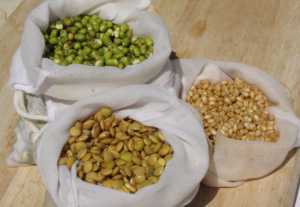Why you’re still low in Vitamin D (and it’s not about sunlight)
If you’ve ever suffered from low energy levels, fatigue, trouble waking up in the morning, depression in winter months or just a general lack of enthusiasm over things, you probably ended up on a standard “why do I feel tired or sad all the time?” google search and concluded that you may be low in Vitamin D. You might have even followed up with a test from your doctor to confirm that you are indeed deficient. But, do you know why you are actually low in Vitamin D, even in summer months when, in theory, just a short exposure to the sun should refill your reserves? Or even if you consume foods (such as dairy products or soy milk), which are “fortified” with Vitamin D?
All information in this article is for educational purposes only.
It is not for the diagnosis, treatment, prescription or cure of any disease or health condition.

There’s more than meets the eye with Vitamin D…
What is Vitamin D
Vitamin D is actually not a vitamin at all; it’s a hormone. Your body makes its own Vitamin D when you expose your skin to direct sunlight (that is, not while using sunscreen) for 10-20 minutes per day, depending on where you live. In North America, for example, you can get Vitamin D from the sun’s ultraviolet (UV) rays during the months of March-October. In winter, your body should have enough reserve so you don’t run low.
You get sun a lot, so why still low?
Here’s the important missing link with Vitamin D: Your body must have magnesium in order to synthesize Vitamin D. And most people are deficient in magnesium, due to a number of reasons. Magnesium is known as the “relaxing mineral” because it helps to calm the central nervous system and relax the muscles, especially during times of stress. Given the high-stress fast-paced round-the-clock lives people are living today, it’s no wonder their magnesium gets burned out, literally on a daily basis. Magnesium is also one mineral that’s difficult to absorb, even in a good digestive system. And who has one of those anymore? A compromised gut, or a leaky gut, will not absorb nutrients well at all.
With no magnesium to make your Vitamin D, you can see how you can never have normal Vitamin D levels. Even if you live in a country with 360 days a year of sun. No wonder people in sunny climates are still low in Vitamin D and are going to the doctor for their D shots year after year.
Getting your Vitamin D levels up is much more about having magnesium than it is about exposure to sun!
The Magnesium Miracle
Magnesium helps you have good energy levels through the day, maintains balanced blood sugars, strengthens kidneys, keeps blood and circulation strong, and is critical for managing stress. In fact, it’s so important for overall health that there’s a book called The Magnesium Miracle. And really, when you start getting the magnesium that your body has been waiting for, it literally feels like a miracle!
By the way, if you happen to crave sugar or chocolate (especially at night), that’s a sure sign of magnesium deficiency! Also, much of your mental health in general can improve with a daily boost of magnesium, which literally helps to calm the nerves.
How I have perfect Vitamin D levels
Yep, you guessed it…I take a magnesium supplement. Every. Single. Day. Summer. And. Winter. Too. And I say that because most people who will buy a new supplement will eventually forget to keep taking it, only for the bottle to become a wonderful collector of dust long forgotten for its original glory. Don’t let that happen with your magnesium! Take it daily, forever. And ever.
How much and what kind of magnesium? I recommend Magnesium Citrate, because it’s easily absorbed (and remember, most people do have compromised gut health). The RDA for magnesium is 400-600mg daily but here’s the deal. Your body (and blood sugars) will benefit from having magnesium all day long, not just one big hit in the morning or night. Otherwise you will be more likely to feel frazzled and start craving sugar at the other end of the day when your magnesium is running low. That’s why I recommend to take 200mg THREE TIMES per day, morning noon and night. With or without food is ok.
You’ll get plenty of other benefits from magnesium too. But most importantly in relation to Vitamin D levels, your body will finally be able to synthesize its own Vitamin D!
If you’re wondering what the signs of magnesium deficiency are, then check out this article I wrote on magnesium deficiency here.
The proof: Test results
I’ve never taken a Vitamin D shot in my life, or a D supplement for that matter. But 1.5 years ago I moved to Asheville NC with my husband, which is pretty cloudy and cold in wither months to say the least! Our first winter, I was pretty much indoors working all the time. And I must admit I did start to wonder about my Vitamin D levels -are they normal? Should I get tested? I wonder if I’m low since I haven’t seen the sun in months??
In February, I flew to Bangkok for work and decided to go straightaway and get a blood test, just to know for sure (nothing wrong with that and I highly recommend you do the same with your medical doctor). The blood test that measures vitamin D is called a 25(OH)D blood test. The result? 100% normal levels of Vitamin D. My D3 levels were 45.6 ng/ml (considered sufficient above 30 ng/ml and very good above 40 ng/ml). Above 40 ng/ml, vitamin D is working well to regulate the level of parathyroid hormone and calcium in the body.
All I can say to that is THANK YOU magnesium!!
Health benefits of Vitamin D
Not to forget why Vitamin D is valuable (and important) for your health..Here are the reasons why your body needs Vitamin D in order to work properly:
- Helps to absorb calcium and promote good bone density
- Sustains good joint health
- Maintains good energy levels
- Boosts immune system
- Helps strengthen blood
Signs you may have a Vitamin D deficiency include:
- Low calcium levels
- Weight gain
- Fatigue/low energy levels
- Depression/melancholy
- Muscle cramping/weakness
- Joint pain







For more on how to achieve your health goals and actually start feeling great, book a private health consult with me via Skype.
How to Book Your Health & Nutritional Coaching Session:
1. Take photos of your eyes with a digital camera.
2. Email the photos to me for approval.
3. We schedule a time to meet via phone or Skype!
More on Detox:
- Is it safe to detox while pregnant or breastfeeding?
- Organic, Vegan & Macrobiotic Food in Kuala Lumpur, Malaysia – Woods Bio Marche
- Okra Pepsin Small Intestine Cleanse
- Featured Superfood: Acai Powder
- Detox Juice Recipe
More on Immune System:


Follow Jennifer